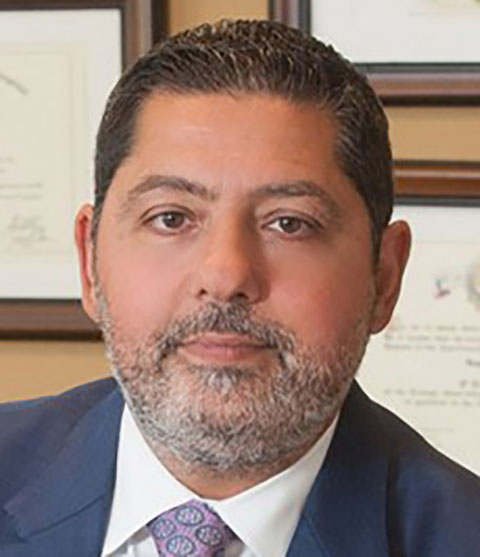
A new state-of-the-art program at Jersey City Medical Center can improve health and extend life for people fighting obesity.

More than two in five adults in the United States are obese, according to the Centers for Disease Control and Prevention. That’s alarming, because people with a body mass index (BMI)—a weight-to-height ratio—greater than 40 live an average of 10 fewer years than those who have a lower BMI, says Ragui Sadek, MD, Chief of Bariatric Surgery at RWJBarnabas Health (RWJBH).
A new Weight Loss and Bariatric Surgery program at Jersey City Medical Center (JCMC) offers solutions that not only can reduce weight but also can lower the risks of obesity-related chronic conditions such as diabetes and heart disease.
Dr. Sadek explains why obesity threatens health and longevity—and how bariatric, or weight loss, surgery can help.
What makes obesity dangerous?
Obesity puts tremendous stress on the body’s metabolic systems and increases the risk of significant and even life-threatening conditions including heart disease, diabetes, and uterine, esophageal and colorectal cancers.
There’s also a correlation between high BMI and grave illness from infection, including from COVID-19. Overweight people tend to have higher levels of inflammation due in part to hormonal imbalances that can weaken the immune system, and they often lack strength in the heart and lungs, so it’s harder for the body to fight infection.
How does bariatric surgery make a difference?
It changes the digestive system in ways that not only foster weight loss but also can lower blood sugar, improve or even cure diabetes, boost cardiopulmonary function and help the body fight infections. Bariatric surgery has had proven success, based on medical literature, at improving health and quality of life.
Who should consider weight loss surgery?
To qualify, you should have a BMI of 40 or greater, or a BMI of 35 to 40 plus one or more other conditions such as Type 2 diabetes, high blood pressure, obstructive sleep apnea, high cholesterol or an enlarged liver. You also must commit to long-term lifestyle changes that allow you to sustain weight loss achieved through surgery.
We develop an individualized plan that includes both surgery and a lifestyle management program, which helps with behavioral adjustments and promotes overall good health.
What happens during weight loss surgery?
It’s not just about what happens during surgery. You undergo extensive evaluation both before and after the procedure involving a range of medical disciplines, including pulmonology, cardiology, gastroenterology, endocrinology and behavioral health. The goal isn’t just to trim your waist size but to achieve long-term health benefits.
The surgeries themselves are typically laparoscopic, minimally invasive procedures performed using small incisions and a camera.
What are some of the surgeries you do most often?
Sleeve gastrectomy, or gastric sleeve, is a procedure in which we remove a large portion of the stomach. With a smaller stomach, the patient eats less and feels full sooner. The procedure also reduces amounts of the “hunger hormone” ghrelin, so we control appetite along with the volume of food and calories the patient consumes.
In another common surgery, gastric bypass, the stomach is divided into two sections. The top section, known as the pouch, serves as a smaller stomach. The pouch is connected to the lower end of the small intestine, bypassing most of the rest and reducing the body’s ability to absorb calories.
What is significant about the new Weight Loss and Bariatric Surgery program at JCMC?
RWJBH has one of the top bariatric surgery programs in the country, offering our advanced skills in managing complex disease. We’re extending the same quality, high standards of care, level of surgical skill and advanced management of obesity and obesity-related conditions that are available across the entire RWJBH system and making them available close to home for patients in Hudson County.
In this entirely new program at JCMC, we offer state-of-the-art bariatric treatment methods that touch on every aspect of care, including preparation for surgery, minimally invasive techniques, pain management, recovery and ongoing post-op weight maintenance.
What is the scope of JCMC’s program?
Our advanced surgical techniques include robotic surgery and advanced endoscopy in addition to laparoscopy. We can perform not only initial bariatric procedures but also revisional surgery for patients who have difficulty achieving their weight goals or need to correct prior surgeries.
But our care extends beyond the operating room. Surgery has changed significantly in recent years, with more research directed to helping patients recover, decreasing complications and preventing postoperative problems. Appropriate preparation prior to surgery makes a significant difference.
For example, a protein liquid diet helps patients lose weight before surgery. It also decreases certain natural hormones in the body while increasing the amount of growth hormone. Recovery is faster, with less fluid shifting, less swelling and less nausea and vomiting. Hydration also decreases nausea and vomiting post-surgery. For pain control, administering certain medications before surgery preemptively blocks pathways that cause postoperative pain and helps facilitate recovery.
I lead a team of board-certified surgeons who have decades of experience in advanced, minimally invasive bariatric procedures, and we’re bringing that high-quality level of care to the local community.
Learn more about weight loss at RWJBarnabas Health.
